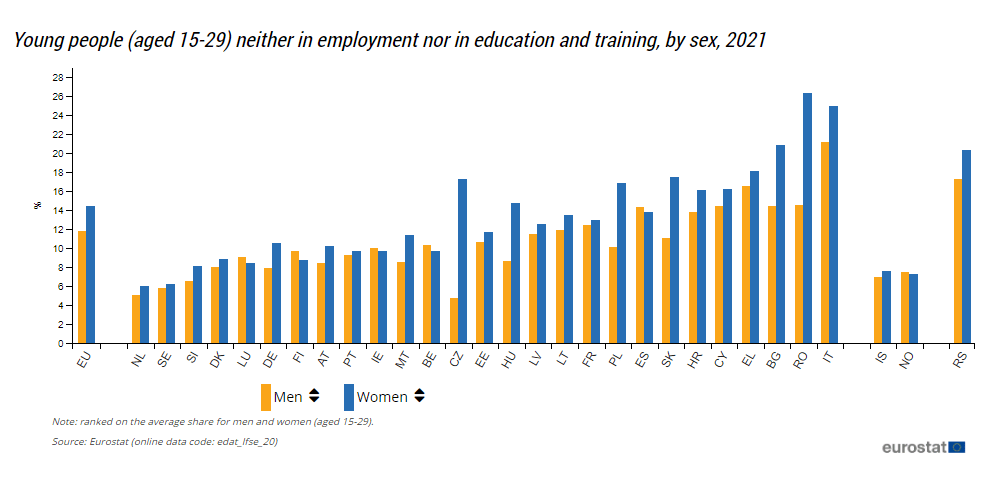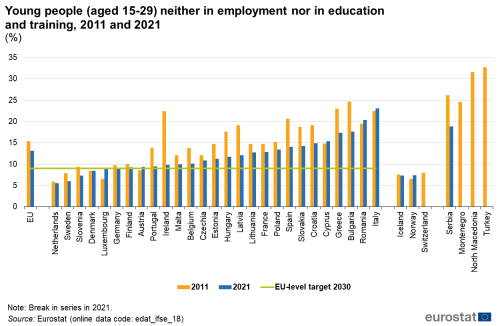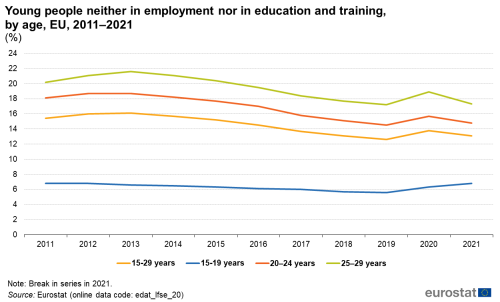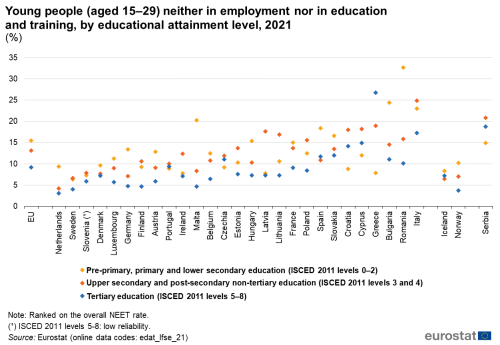Today young people are changing jobs more frequently and it takes a longer time to get established on the labour market. Therefore, it is important to make sure that the transition from education to work is smooth and also highlight the risks of being neither in employment nor in education or training. There are risks, both for the individual and in the long run for society, if young adults find themselves disengaged from both education and the labour market.
The NEET rate within the EU and its Member States 2021
Given that the EU strives to lower the rate of young people who are NEETs for people aged 15-29 to 9 % by 2030, the article will focus on this age group. While background information is provided for those aged 15-34, the main age group that is studied in this article consists of young adults aged 15 to 29. For this age group, the European Union has set an EU-level target stipulating that the share of young people neither in employment nor in education or training should be less than 9 % by 2030. In 2021, an average of 13.1 % was identified as NEET within EU. However, there are differences between Member States as several countries have already reached the goal for 2030.
Across the EU Member States there are wide variations in 2021 when looking at the NEET rates for the age group that is targeted, see Figure 2. The lowest rates were already below the target of 9.0 % and found in the Netherlands, Sweden, Slovenia, Denmark and Luxembourg; this was also the case in Iceland and Norway. These countries thus reached the long term EU-level target for 2030 in 2021 or earlier.
Furthermore, there were nine Member States that recorded NEET rates above the EU average of 13.1 % in 2021. Among these, the highest rates were recorded in Italy and Romania, where more than 20 % of all young people aged 15–29 were neither in employment nor in education or training.
A comparison between the two EU Member States with the highest and lowest NEET rates in 2021, reveals that the proportion of young adults who were NEETs was 4.2 times as high in Italy than in the Netherlands.
The overall share of NEETs decreased in the EU by 2.3 percentage points (pp.) between 2011 and 2021. Among the EU Member States, the largest reduction in the NEET rates (in percentage point terms) between 2011 and 2021 was by far in Ireland (-12.6 pp.) followed by Bulgaria (-7.1 pp.) and Latvia (-7.0 pp.). There were also five Member States that had increases in their NEET rates since 2011, these countries are: Luxembourg (by 2.2 pp.), Austria (0.9 pp.), Romania (0.8 pp.), Italy and Cyprus (both 0.6 pp.).

Protecting mental health in the digital work environment |
Development of NEETs in the EU over time for different age groups
Figure 3 shows the development of NEETs for different age groups within the EU from 2011 to 2021. In the beginning of the time series the share of NEETs still rose as a result of the financial crisis in the late 2000s. The share peaked in 2013 and after that the proportion of NEETs continuously decreased until 2019. However, with the onset of the COVID-19 pandemic in 2020, the share of young adults neither in employment nor in education or training rose. This is natural since the NEET rate for young people is closely linked to economic performance and the business cycle. The financial and economic crisis in the late 2000s led to a record number of NEETs. Policymakers were concerned that this could lead to an entire generation of young people in the EU remaining out of the labour market for years to come. The economic downturn related to the COVID-19 pandemic raises similar concerns.
Figure 3 shows that the share of NEETs decreased considerably in 2021 compared to 2020 for all age groups except for those aged 15–19. For the age group of the EU-level target the share of NEETs was 13.1 % in 2021, the corresponding share was 6.8 % for those aged 15–19, 14.8 % for those aged 20–24 and 17.3 % for those aged 25–29. In 2021 the shares were still higher than before the pandemic but the differences were considerably smaller which might be an indication of recovery.
In 2021, the NEET rate for young people aged 15–29 in the EU was 15.5 % among those with a low level of education, compared with 13.1 % among those with a medium level of education and 9.2 % among those with a high level of education (see Figure 4).
NEET rates in the EU Member States for people aged 15–29 with a low level of education ranged from 6.4 % in Sweden to 32.7 % in Romania in 2021. Looking more closely at these figures six countries had higher NEET rates than the average for the EU and these countries were: Slovakia (16.6 %), Spain (18.4%), Malta (20.3 %), Italy (23.0 %), Bulgaria (24.4 %) and Romania (32.7 %).
Among young people aged 15–29 with a medium level of education, NEET rates ranged from 4.2 % in the Netherlands up to a peak of 24.9 % in Italy. For this level of education, two countries recorded a NEET rate of 19 % or higher (Greece and Italy) while the only country with a share lower than 5.0 % was the Netherlands.
Concerning people aged 15–29 with tertiary education, their NEET rates were in general considerably lower than for the other levels of education. The lowest share was 3.1 % in the Netherlands but a value as high as 26.8 % was reported in Greece.
It is common to have high NEET rates for people with a low level of education and low NEET rates for people with a high level of education. Comparing the three levels of education at Member State level, NEET rates were almost always highest for young adults with a low or medium level of education compared to tertiary education (the only exception being Greece). Looking at the other end of the scale, young adults with tertiary education recorded the lowest NEET rates in 2021 in all but six EU Member States (namely Portugal, Czechia, Croatia, Cyprus, Spain and Greece) where lowest NEET rates were found for those with medium level (Spain) or low level of education (all other five countries).
For further information: Eurostat











Leave a Reply